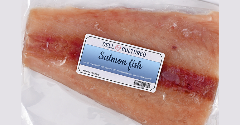News
Snack trends, ingredient claims, and plant-based perceptions: Highlights from Fi Europe 2023, part 1
7 Dec 2023Value-led snacking, sustainability storytelling, and the importance of having a ‘star ingredient’: we asked consumer analysts and market experts at Fi Europe about the trends and innovations that are shaping the food industry.
The rise of the ‘values-oriented’ consumer is changing US snack products
According to Brandon Casteel, vice president of partnerships at SPINS, snacking products have “definitely changed”.

SPINS tracks retail sales data across the US and combines this with detailed information about each stock keeping unit (SKU), such as ingredient lists, health claims, positioning, and more. Last year, it also began conducting consumer surveys.
“We started about a year ago asking consumers specific questions about all products and snacks as well,” said Casteel. “And what we overwhelmingly heard was that they are not just caring about whether a product is clean or organic; they care, at an increasing level, where the product came from. What farming methods were used in making this product? How were the humans and animals treated in the process of bringing it to life?"
This was such a significant trend that SPINS coined a new term for this segment of the population: the values-oriented consumer.
"When we look within snacking in particular, 77% of values-oriented consumers read the entire ingredient panel before deciding to make a purchase. That's a really big difference than a couple of years ago, especially when compared against the standard consumer population [...]. They are one a half times more likely to read the entire ingredient panel,” said Casteel.
"What you have, as a result, is a far more educated consumer understanding what is in their snacks and that has made a huge difference in how products are being sold and marketed, research and formulation developments. They want more health benefits from their snacking occasions."
This has led to the rise of functional ingredients, such as added protein in categories not usually associated with this macronutrient. Recent product launches in the US include protein-infused chips, such as Wilde Brands’ chicken chips made from chicken breast, egg whites, and bone broth. Other functional products recently launched in the US are True Dream’s melatonin-infused sparkling water and even collagen-fortified cold cereals.
Brands must communicate about sustainability – but avoid greenwashing
Euromonitor data shows that 64% of people are concerned about climate change. How can brands translate this into products that help people make a positive impact?
"I think it's quite a challenge for companies to communicate what they are actually doing,” said Euromonitor analyst, Linda Lichtmess.
She noted that some companies have become reluctant to communicate about their sustainability efforts over fears that they will be accused of greenwashing.
"I think there is a bit of tension. Consumers do actually expect a lot from companies [and] from regulators but there is tension because they might also think that companies only care about their profit […] or their brand reputation, especially the younger generation [that] talks about authenticity. Consumers are seeking more transparency from companies and this would also help the brand reputation. So, I think that tension is more of a miscommunication.”
Companies should not shy away from communicating about their Corporate Social Responsibility (CSR) efforts but must be mindful that any claims should be substantiated by evidence, such as third-party certification.
Consumers want plant-based alternatives that are less ‘ultra-processed’
Sales of plant-based meat products in US supermarkets are falling. In value terms, they have fallen by 9% year-over-year and, in volume terms, they are down by 15%, according to Cyrille Fillot, global strategist at Rabobank.
“I think the trends behind plant-based are still there – animal welfare, sustainability, and perhaps nutrition – but consumers are not buying these products as much as everybody expected,” he said.
So, what can manufacturers do to win back these consumers? Many industry analysts have called for a more “whole food” approach to plant-based formulation, using minimally processed ingredients like beans and vegetables rather than highly processed ones, such as protein isolates and concentrates. But do consumers want to eat beetroot and bean burgers rather than a burger that tastes like a beef patty?
"I'm not entirely sure,” said Fillot, “but what we do know is that they are not necessarily interested in this ultra-processed food. They are looking at the back of pack of the burger and are saying, '17 ingredients – what am I eating?'. That is why we believe there is definitely a market for products that have whole plants in them or at least that have ingredients that are identifiable for the consumer."
Cyrille Fillot gave a presentation at the Fi Europe Conference entitled, ‘Back to the drawing board for plant-based meat’. Click here to read more.
Make sure your product has a ‘star ingredient’
Innova's top trend for 2024 is 'All about ingredients'. Brands should feed into positive consumer attitudes towards key ingredients by promoting a product’s “star element”, it said, noting that 42% of consumers globally believe protein to be the most important ingredient.
"Ingredients are taking the spotlight and I think that trend has really evolved from the past years [when] the consumer wanted to understand what is in the product and why, about the sustainability and storytelling,” said Nicole Jansen, team manager for insights and innovation at Innova Market Insights. “Now, I think we have arrived at a moment where they have a better understanding of the ingredient and [want to know] what is the benefit of a certain ingredient.”
Some manufacturers may draw attention to a healthy star ingredient in a product that high in fat, salt, or sugar, for example, using a health claim to market a sugary drink. Is this a risky strategy?
“I think, overall, the most important is that brands are authentic and transparent,” said Jansen. “I wouldn't necessarily try to make a product more positive by highlighting one positive ingredient if you are talking about a really sugary drink – that then might lead to the risk that consumers do not trust the brand anymore. Nowadays, trust and transparency are so important.
She added: “Companies need to be authentic about what they do and if there is the slightest chance of the consumer thinking, 'oh, this sounds a bit sketchy', they might lose trust. Always be very honest. But I do think a star ingredient is what you want to make it. It can be protein but it could be another ingredient that fits the product."
Related news

California companies required to disclose heavy metal content in baby food
10 Jan 2025
As of January 2025, baby food manufacturers selling in California must disclose test results for four heavy metals – arsenic, lead, cadmium, and mercury – via an on-pack QR code.
Read more
Confirmed: California bans four ‘toxic’ food additives
10 Oct 2023
Four food additives, including the colouring Red No. 3, will be banned in food in the US state of California over safety concerns, with public health campaigners hoping this will spark a nationwide ban in the coming years.
Read more
Advocacy groups condemn EU Commission for backpedalling on animal rights
3 Oct 2023
Amid rumours that the EU may abandon its plans to improve animal welfare in farming and end the use of cages, many stakeholders have condemned this possibility and urged the EU to reconsider.
Read more
Poland and Ukraine attempt to resolve grain dispute
29 Sep 2023
Poland and Ukraine have begun talks to try to resolve a dispute regarding the ban on Kyiv’s grain imports that prompted Kyiv to file a lawsuit to the World Trade Organization.
Read more
The EU may be set to scrap its sustainability commitments
27 Sep 2023
A speech delivered by President Ursula von der Leyen last week inferred that the EU could be drawing back on its commitments to create a more sustainable and healthier food system.
Read more
Industry first: Mosa Meat becomes first cultivated meat startup to gain B Corp certification
11 Sep 2023
A first for the industry, Dutch cultivated meat company Mosa Meat announced that it has received B Corp certification and will soon apply for regulatory approval across the globe.
Read more
German supermarket trials climate-centric pricing model
29 Aug 2023
German discount supermarket Penny has trialled increasing product prices to mirror their health and environmental costs.
Read more
EPR fee delay spurs concerns over UK’s sustainability commitment
8 Aug 2023
The UK government’s decision to push back the introduction of fees for the Extended Producer Responsibility (EPR) due to inflation has raised doubts about whether this sustainability commitment will ever be realised.
Read more
Latino-owned food startups tackle climate change
25 Jul 2023
A growing list of Latino-founded food and beverage startups in the US are putting sustainability at the forefront of their businesses for the sake of the planet.
Read more
Industry first: The Netherlands approves cultivated meat and seafood tastings
17 Jul 2023
The Netherlands has become the first country in Europe to approve tastings of cultivated meat and seafood in controlled environments, yet there is still a long way to go before widescale commercialisation is achieved.
Read more